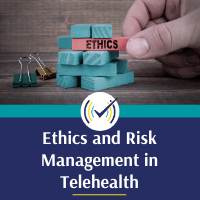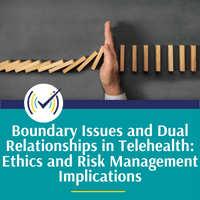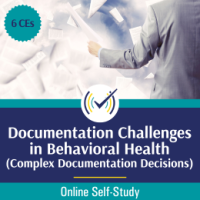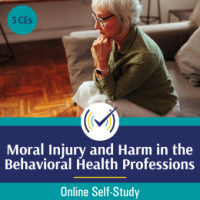When ethical clarity is most needed, are you prepared to respond—or left questioning your next step?
This bundle brings together five essential, expert-led courses that help you:
- Navigate complex ethical dilemmas in telehealth and in-person practice with confidence.
- Protect your clients and your practice by mastering risk management strategies for documentation and boundaries.
- Understand the ethical implications of emerging technologies like Artificial Intelligence in behavioral health.
- Make sound, defensible decisions on complex documentation challenges.
- Address the profound impact of moral injury and harm within the behavioral health professions.
Having chaired the national task force that authored the NASW Code of Ethics and contributed to technology standards for the profession, Dr. Reamer is uniquely qualified to guide clinicians through complex ethical terrain.
What’s Included in the Bundle (5 Courses – 18.5 CE Hours Total):
Boundary Issues and Dual Relationships in Telehealth: Ethics and Risk Management Implications (3.5 Ethics CEs)
$70
Normally $427—Now Just $299
Get all 5 courses (18.5 CE hours total) for just $299—a $128 savings compared to buying them individually.

When You Enroll, You’ll Get:
- Instant access to 5 self-study courses, each offering CE credit
- Instruction provided by an expert in the field - Dr. Frederic G. Reamer - centered around Ethics and Boundaries
- Downloadable slides and resources
- A discount off individual course registration fees
In this self-paced training bundle, Dr. Reamer delivers clear, practical frameworks through engaging case analysis, legal insights, and real-world scenarios. With his characteristic clarity and depth, he translates abstract ethical principles into actionable protocols.
Key Takeaways
- Build ethical agility in digital spaces: Strengthen your ability to navigate telehealth, documentation, and AI challenges with ethics-informed strategies.
- Protect your license and your clients: Develop protocols that mitigate risk, prevent complaints, and support defensible decision-making.
- Restore professional integrity and resilience: Address moral distress and injury with evidence-based tools for clinician well-being and sustainability.
Why This Course Bundle?
- Expert instruction with unmatched credibility: Learn directly from the social worker who helped write and revise the NASW Code of Ethics.
- Comprehensive yet practical: Each course goes deep without overwhelming, offering concrete takeaways and tools you can use immediately.
- One powerful learning experience: Gain 18.5 CE hours from a single, thoughtfully curated bundle—saving you time while deepening your ethical fluency.
The ethical complexities of modern behavioral healthcare require more than good intentions—they demand well-informed action.
Enroll now in this essential course bundle to access Dr. Reamer's expert instruction and gain the tools, insight, and clarity you need to confidently meet the moment.
Enrollment in this bundle is offered at a discount of 30% off the full price for each course.
This bundle consists of 5 individual non-interactive self-study courses that address topics of ethics and boundaries. These courses offer a total of 18.5 CEs. Each course includes a separate certificate of completion. Courses included in this bundle:
- Ethics & Risk Management in Telehealth: Standards for Social Work, 3 CEs (Learn More)
- Boundary Issues and Dual Relationships in Telehealth: Ethics and Risk Management Implications, 3.5 CEs (Learn More)
- Ethical Use of Artificial Intelligence in Behavioral Health, 3 CEs (Learn More)
- Documentation Challenges in Behavioral Health (Complex Documentation Decisions), 6 CEs (Learn More)
- Moral Injury and Harm in the Behavioral Health Professions, 3 CEs (Learn More)
Once each course has been completed, individual Certificates of Completion indicating CEs will be issued.
Courses included in this bundle were recorded between 2/5/21 and 4/25/25
1. Ethics & Risk Management in Telehealth: Standards for Social Work
One ethical misstep in telehealth—however unintentional—can end a career, harm a client, or lead to devastating legal consequences. As telehealth reshapes behavioral healthcare, clinicians must navigate a minefield of confidentiality pitfalls, boundary risks, and shifting regulatory expectations.
This course offers you more than compliance—it delivers peace of mind by equipping you with the critical skills and protections you need to practice safely and ethically in a digital world.
Learning Objectives:
- Describe ethical challenges related to social workers' use of technology to serve clients remotely
- Explain prominent ethics and practice standards governing social workers' use of technology
- Describe federal and illustrative state laws that govern social workers' use of technology
- Discuss practical risk management strategies to protect clients and help prevent lawsuits and licensing board complaints
2. Boundary Issues and Dual Relationships in Telehealth: Ethics and Risk Management Implications
What happens when your client Googles you, sends a Facebook friend request, or finds your personal blog? What if you’re tempted to search for their online presence—or respond to a missed appointment through social media? In this digital age, boundary issues can arise with just one click, and even well-meaning decisions can spiral into serious ethical violations.
As behavioral health care increasingly moves into virtual spaces, clinicians face unprecedented challenges navigating dual relationships, confidentiality, and online interactions. This course offers insight, clarity, and actionable strategies to ensure your practice remains ethical, professional, and legally sound.
Learning Objectives:
- Identify boundary and dual relationship issues associated with telehealth.
- Apply relevant ethics, regulatory, and practice standards to manage boundary and dual relationship challenges.
- Design and implement protocols to protect clients.
- Design and implement protocols to help prevent ethics-related litigation and licensing board complaints.
3. Ethical Use of Artificial Intelligence in Behavioral Health
Artificial intelligence is transforming behavioral healthcare—offering new tools for clinical practice, yet raising urgent ethical questions practitioners cannot afford to ignore. As AI becomes more embedded in service delivery, the consequences of uninformed use range from compromised client safety to legal risk and professional censure.
Behavioral health professionals now face a rapidly shifting technological landscape where ethical blind spots can have high stakes. This course offers a timely, comprehensive, and practical guide for navigating the ethical complexities of AI with clarity and confidence.
Learning Objectives:
- Identify the ways in which artificial intelligence is being used in the behavioral health professions
- Identify ethical issues and challenges associated with the use of artificial intelligence in the behavioral health professions
- Develop ethics-informed policies and protocols to protect clients and practitioners
4. Documentation Challenges in Behavioral Health (Complex Documentation Decisions)
One error in your clinical documentation can open the door to litigation, licensing board complaints, or serious harm to your client’s safety and dignity. In today’s behavioral health landscape—where records are accessible to clients, courts, and insurers—every note you write can either shield or expose you. Precision, ethics, and risk management are no longer optional; they are the foundation of professional survival. This course equips you to meet these high-stakes challenges head-on by transforming documentation from a vulnerability into a powerful tool for client care and self-protection.
Whether you're navigating subpoenas, safeguarding privacy in digital platforms, or trying to avoid ambiguous wording that could be used against you, this course provides critical guidance and strategies for real-world documentation dilemmas.
Learning Objectives:
- Identify the diverse purposes of documentation.
- Address documentation challenges related to client privacy, confidentiality, and privileged communication.
- Identify the implications of skilled documentation for risk management in behavioral health.
- Implement ethics-informed documentation strategies to protect clients and prevent lawsuits and licensing board complaints.
5. Moral Injury and Harm in the Behavioral Health Professions
When behavioral health professionals are asked to carry out duties that contradict their deepest ethical convictions, the emotional consequences can be devastating. This course sheds light on the invisible wounds many clinicians carry—and offers a roadmap for healing, advocacy, and transformation.
Moral distress and injury don’t just affect the well-being of clinicians—they shape the quality of care they can provide and their ability to remain in the field. This powerful training invites participants to confront difficult realities and equips them with the tools to restore integrity and resilience in their practice.
Learning Objectives:
- Identify common symptoms and manifestations of moral distress and injury in behavioral healthcare.
- Design state-of-the-art strategies to address moral distress and injury.
- Develop protocols to promote prevention, self-care, and resilience.
Credit Hours: This bundle consists of a total of 18.5 continuing education hours (9.5 of which are ethics) of credit. Each course offers an individual certificate of completion indicating CEs earned for that course.
Counselors: Telehealth Certification Institute, LLC has been approved by NBCC as an Approved Continuing Education Provider, ACEP No, 6693. Programs that do not qualify for NBCC credit are clearly identified. Telehealth Certification Institute, LLC is solely responsible for all aspects of the programs.
Telehealth Certification Institute, LLC is recognized by the New York State Education Department's State Board for Mental Health Practitioners as an approved provider of continuing education for Licensed Mental Health Counselors. #MHC-0048.
Marriage and Family Therapists: Many MFT licensing boards accept our courses or one of the approvals which we have from professional associations. You can check with your board to determine if your licensing board would accept this course.
Telehealth Certification Institute, LLC is recognized by the New York State Education Department's State Board for Mental Health Practitioners as an approved provider of continuing education for licensed marriage and family therapists #MFT-0135, effective May 8, 2025.
Social Workers: Telehealth Certification Institute LLC, #1609, is approved as an ACE provider to offer social work continuing education by the Association of Social Work Boards (ASWB) Approved Continuing Education (ACE) program. Regulatory boards are the final authority on courses accepted for continuing education credit. ACE provider approval period: 05/02/2024 – 05/02/2027. Social workers completing these courses receive 9 continuing and 9.5 ethics education credits.
Telehealth Certification Institute, LLC is recognized by the New York State Education Department's State Board for Social Work as an approved provider of continuing education for Licensed Social Workers #SW-0435.
Addiction Professionals: This course has been approved by Telehealth Certification Institute LLC, as a NAADAC Approved Education Provider, for educational credits. NAADAC Provider #193104, Telehealth Certification Institute LLC is responsible for all aspects of the programming.
*Review individual course details for addiction professional approval
Psychologists: Telehealth Certification Institute LLC is approved by the American Psychological Association to sponsor continuing education for psychologists. Telehealth Certification Institute LLC maintains responsibility for this program and its content.
Telehealth Certification Institute, LLC is recognized by the New York State Education Department’s State Board for Psychology as an approved provider of continuing education for Licensed Psychologists #PSY-0128.
Art Therapists: Telehealth Certification Institute, LLC is recognized by the New York State Education Department's State Board for Mental Health Practitioners as an approved provider of continuing education for Licensed Creative Arts Therapists #CAT-0093.
Other Professionals: This course qualifies for 1,110 minutes of instructional content as required by many national, state and local licensing boards and professional organizations. Retain your certificate of completion and contact your board or organization for specific filing requirements.
These are non-interactive, self-study courses.
Online self-study courses are non-interactive and include recorded instruction, a post-test and evaluation. Participants have 6 months from registration to complete coursework and claim the certificate of completion.
Instructor
Frederic Reamer is professor emeritus in the graduate program, School of Social Work, Rhode Island College, where he has been on the faculty since 1983. His teaching and research focus on professional ethics, criminal justice, mental health, health care, and public policy. Dr. Reamer received his Ph.D. from the University of Chicago and has served as a social worker in correctional and mental health settings. He chaired the national task force that wrote the Code of Ethics adopted by the National Association of Social Workers in 1996 and served on the code revision task force. Dr. Reamer also chaired the national task force sponsored by the National Association of Social Workers, Association of Social Work Boards, Council on Social Work Education, and Clinical Social Work Association that developed technology standards for the profession. Dr. Reamer has lectured nationally and internationally on social work and professional ethics, including in India, China, Singapore, South Korea, Japan, Taiwan, and in various European nations. His books include Risk Management in the Behavioral Health Professions; Social Work Values and Ethics; Risk Management in Social Work; The Social Work Ethics Casebook; Ethical Standards in Social Work; Boundary Issues and Dual Relationships in the Human Services; Ethics and Risk Management in Online and Distance Behavioral Health; Moral Distress and Injury in Human Services; and The Social Work Ethics Audit, among others. Dr. Reamer has served as an expert witness in many court and licensing board cases throughout the United States.
 Frederic G. Reamer, Ph.D.
Frederic G. Reamer, Ph.D.Testimonials
Bridgette Nalumu
Public health consultant, Green and Purple Consultancy Network
Lora Verley
Clinical Therapist, Bayless Integrated Healthcare
Jackie Tanna
Therapist, Region One Mental Health
Jackie Bell-Russell
Therapeutic Behavioral Strategist, Rialto Unified School District





